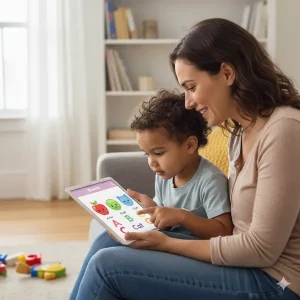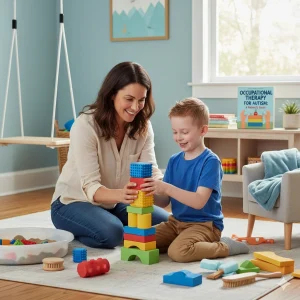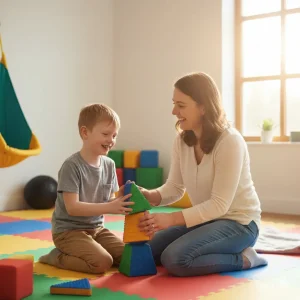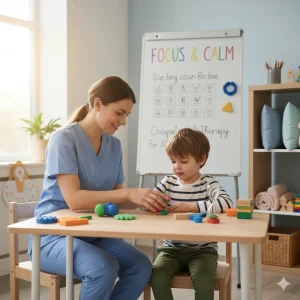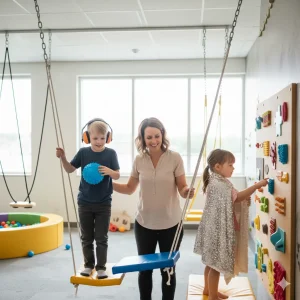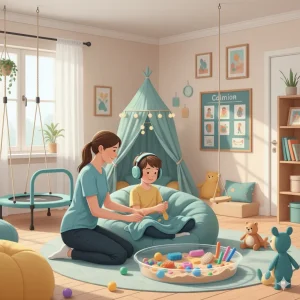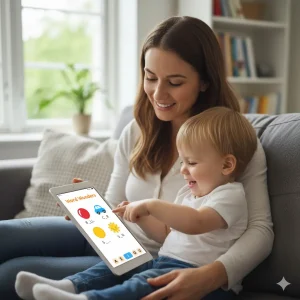Should I Be Worried If My 3-Year-Old Still Needs Prompts to Talk?
Last Updated: August 19, 2025
Worried your 3-year-old only talks when you prompt them? You’re not alone — and it might not be a reason to panic. Many parents begin to wonder if something’s wrong when their toddler doesn’t speak unless asked a question or given a verbal cue. By age 3, most children are expected to engage in simple conversations, express basic needs, and start using spontaneous language. So when your child seems quiet, hesitant, or only responds when prompted, it’s natural to feel concerned.
Free Speech Help for Kids
Concerned about speech delays? Book a free consultation with our expert speech therapist and get guidance tailored to your child’s needs.
What’s Typical: Speech Milestones for 3-Year-Olds
By age 3, children often make big leaps in how they talk, listen, and express themselves. While every child develops at their own pace, understanding the typical speech milestones for toddlers can help parents know what to expect—and when to take action if something feels off.
Also read : Is Your Toddler Talking Yet? 18–24 Month Speech Milestones Checklist
Common Speech and Language Milestones at Age 3
Here’s what’s generally expected in speech development in 3-year-olds:
- Uses 3–4 word sentences like “I want milk” or “Daddy go work”
- Speaks clearly enough for familiar adults to understand most of the time
- Asks simple questions like “What’s that?” or “Where go?”
- Names common objects, body parts, and people
- Follows two-step directions like “Get your shoes and bring them to me”
- Talks about things that happened during the day or things they remember
- Begins using basic grammar (plurals, simple tenses, pronouns like “me” or “you”)
These milestones reflect both the child’s ability to understand language and their ability to express it—two important parts of language development at age 3.
Receptive vs. Expressive Language: What’s the Difference?
Understanding the difference between receptive and expressive language is key when tracking your child’s speech progress:
- Receptive Language is what your child understands. This includes following instructions, recognizing their name, or pointing to objects when asked.
- Expressive Language is how your child expresses themselves. This includes using words, gestures, or sentences to communicate their thoughts or needs.
A 3-year-old might have strong receptive language (they understand everything you say) but weaker expressive language (they rarely speak unless prompted). That’s an important clue when considering whether your child may need extra support.
When Prompts Are Still Needed: Is It Normal?
If you’ve ever asked yourself, “Why does my 3-year-old only talk when prompted?”, you’re not alone. Many parents notice their toddler seems to understand everything but doesn’t speak much unless they’re directly asked a question. This can be confusing and even worrying—especially if your child isn’t initiating conversations or expressing their thoughts spontaneously.
But here’s the good news: sometimes, this behavior is completely normal for certain children.
Why Some 3-Year-Olds Only Talk When Asked To
There are a few common reasons why a toddler only talks when asked questions:
- Personality and Temperament
Some children are naturally more observant or introverted. A quiet toddler might prefer listening and thinking before speaking. This doesn’t always mean there’s a problem—it might just be their style. - Late Bloomers
Just like walking or potty training, language development varies. Some children are late talkers who simply need more time and practice before they start speaking independently. - Over-Reliance on Prompts
If a child is used to adults doing most of the talking, they may wait for prompts out of habit. For example, if we always ask, “What’s this?” or “Say thank you,” they may learn to speak only when cued. - Limited Confidence
Some toddlers are hesitant or reluctant to talk because they’re not sure how to say something, or they’re afraid of getting it wrong. This is common in children who are still developing their expressive language.
Signs That Might Still Be Within the Typical Range
If your child:
- Understands what you’re saying (follows instructions, reacts to names)
- Uses words when prompted, even if not often on their own
- Shows interest in communicating (pointing, gesturing, or making sounds)
- Seems socially engaged (smiles, plays, makes eye contact)
…then they may simply be on the quieter end of the speech development spectrum. While it’s always wise to stay observant, these signs suggest your child is still within a typical developmental range—just with a preference for responding rather than initiating.
A Gentle Note for Parents
If you’re seeing progress—even slow and steady—it’s a positive sign. Many quiet toddlers find their voice with a little time, encouragement, and playful interaction. However, if your gut tells you something feels off, it’s always okay to seek advice from a pediatrician or speech therapist. Early support can make a big difference.
Red Flags: When to Be Concerned About Speech Delay
While some toddlers are naturally quiet or take a little longer to start talking, certain behaviors may point to something more than just late blooming. As a parent, it’s important to know the signs of speech delay in toddlers so you can act early if needed.
If your 3-year-old is not talking without prompts, and you rarely hear them initiate conversation or use new words on their own, it could be time to take a closer look at their expressive language development.
Warning Signs That May Signal a Communication Delay
Here are some red flags that may suggest your child is facing an expressive language delay or broader communication challenges:
- Only uses a few words or short phrases
By age 3, most children should be speaking in simple 3–4 word sentences. If your toddler is still using mostly single words or short, repetitive phrases, that’s worth noting. - Rarely talks without being prompted
A 3-year-old not talking without prompts—and relying mostly on questions or cues to speak—may be struggling to generate language on their own. - Understands language but can’t express thoughts
This often indicates a specific expressive language delay, where your child knows what they want to say but has trouble forming the words or sentences. - Frustration or tantrums instead of words
If your toddler gets easily upset when they can’t communicate, this can be another sign that expressive skills aren’t keeping up with receptive language.
Speech Delay vs. Autism: What’s the Difference?
Parents often wonder whether a speech delay could be an early sign of autism. While not all children with speech delays are autistic, there are some important differences to be aware of.
Speech Delay (on its own):
- Child may be quiet but socially responsive
- Makes eye contact, smiles, plays with others
- Follows instructions and enjoys being around people
- Tries to communicate using gestures or sounds
Autism Spectrum Disorder (ASD):
- May show limited eye contact or social interest
- Doesn’t respond to name consistently
- Struggles with pretend play or joint attention (like pointing to show you something)
- May have repetitive behaviors or intense focus on specific objects
If you notice a combination of speech delay and social communication challenges, it’s a good idea to speak with a developmental pediatrician or speech-language pathologist who understands the early signs of autism.
Every Child Is Unique—But Early Action Helps
If you’re unsure whether your toddler is simply a late talker or showing signs of something more, don’t wait it out in silence. Early evaluation doesn’t mean labeling your child—it means getting them the support they may need to thrive.
Whether it’s an expressive language delay, a more global developmental delay, or something else entirely, catching it early gives your child the best chance to build strong communication skills with confidence.
What Causes a Child to Need Prompts to Speak?
If your toddler understands what’s being said but doesn’t initiate speech on their own, it can leave you wondering why. You might find yourself constantly asking questions just to hear a few words. This reliance on verbal prompts—like “What do you say?” or “Tell me what you want”—can be a sign that your child needs cues to speak rather than speaking spontaneously.
So what causes this pattern, and when is it something to be concerned about?
1. Shyness or Reserved Temperament
Some children are simply more quiet by nature. A shy or introverted child might feel nervous about speaking, especially in unfamiliar situations or around new people. These kids may understand language well but hold back on using it unless prompted. While this doesn’t always mean there’s a delay, it can lead to less practice speaking freely—especially in social settings.
Tip: Giving your child more low-pressure chances to speak (like through play) can help them warm up and express themselves more confidently.
2. Expressive Language Delay
When a child needs cues to speak consistently—even in familiar, low-stress environments—it could indicate a communication delay in a 3-year-old. Specifically, this may reflect an expressive language delay, where the child understands what’s being said (receptive language) but struggles to form their own words or sentences.
Children with expressive delays may:
- Repeat only parts of what you say
- Speak less than peers their age
- Seem frustrated when they can’t express themselves
- Use gestures or sounds instead of words
In these cases, your child isn’t being quiet by choice—they simply haven’t yet developed the skills or confidence to speak on their own.
3. Environmental Factors
Believe it or not, the way we interact at home can also influence a child’s speech habits. If adults often speak for the child—by anticipating needs or finishing sentences—the child may become passive in communication.
This is sometimes called the “prompt dependency cycle”, where the child waits to be cued before speaking.
Example: You always say “Say thank you,” so your child never initiates a thank-you on their own. Over time, they rely on these cues to engage in conversation.
4. Neurodiversity or Developmental Differences
Sometimes, a child who doesn’t initiate speech may be showing early signs of neurodiversity, such as Autism Spectrum Disorder (ASD) or Social Communication Disorder. These children may communicate differently, and often need more structured support to learn how to initiate interaction or conversation.
They might:
- Speak only when highly interested in a topic
- Repeat phrases (echolalia) rather than create their own sentences
- Seem unaware of social turn-taking in conversation
This doesn’t mean something is “wrong”—but rather that your child may need a different path of support to develop strong, confident communication skills.
Bottom Line: Look at the Bigger Picture
If your 3-year-old needs cues to speak or rarely speaks unless asked to, it’s important to look beyond just the number of words. Consider how they use language in everyday life: Do they ask questions? Do they tell you about their day? Do they use words on their own during play?
When spontaneous speech is missing, or if your child isn’t initiating communication at all, it’s a good idea to connect with a speech-language pathologist. The sooner you identify what’s going on, the sooner you can start supporting your child’s unique communication journey.
How to Encourage Independent Talking at Home
If you’ve been wondering how to help a 3-year-old talk more—especially without always needing to prompt them—you’re not alone. Many parents are eager to hear their child speak freely, share thoughts, or ask questions on their own. The good news? With the right strategies and a little patience, you can create a home environment that naturally encourages your child to speak more spontaneously.
Whether your child is just starting to use words or needs a bit of a nudge to talk on their own, here are simple, effective ways to start encouraging communication in toddlers every day.
1. Use Open-Ended Questions
Instead of questions that can be answered with a simple “yes” or “no,” try asking open-ended ones that invite your child to think and speak.
- Instead of: “Did you have fun at school?”
- Try: “What did you do at school today?”
This encourages more than a one-word response and helps develop expressive language.
2. Narrate Your Day (And Theirs)
Talk about what you’re doing in real time, even if your child isn’t responding much yet.
- “I’m cutting the apple. It’s red and juicy.”
- “You’re putting the blocks on top—wow!”
This models language and helps build vocabulary. Over time, your child may begin to copy this habit and start describing things on their own.
3. Use Visual Aids and Picture Cues
Visuals are powerful for children who are still building language. Use:
- Flashcards with everyday objects
- Storybooks with rich illustrations
- Visual choice boards (“Do you want juice or milk?”)
These tools make language more concrete and are especially useful in daily speech activities for toddlers.
4. Pause and Wait
This one’s simple—but often overlooked. After you ask a question or make a comment, pause for 5–10 seconds. Give your child a chance to process and respond.
That extra pause tells them: “This is your turn to talk.”
It builds independence and reduces prompt dependency over time.
5. Model and Expand
When your child says something short, repeat it back and expand on it.
- Child: “Car!”
- You: “Yes, a big red car is going fast!”
This technique, used in many speech therapy tips for 3-year-olds, helps children learn sentence structure and new vocabulary in a natural way.
6. Make Speech Part of Play
Playtime is one of the best times to build language. Use toys to spark conversation:
- Ask your child to be the “teacher” and explain the rules of the game
- Role-play with dolls, animals, or action figures
- Use pretend play to practice new words: “Let’s make pizza! What do we need?”
These simple games can do wonders for encouraging communication in toddlers—especially when they’re fun and low-pressure.
Keep It Light, Consistent, and Encouraging
The goal is not to pressure your child into talking more—it’s to invite them to talk by making communication enjoyable, meaningful, and part of daily life. Praise their efforts, stay patient, and celebrate the little wins.
Even just 15 minutes of daily speech activities for toddlers—like reading, singing, or chatting during play—can help your child grow in confidence and independence when it comes to speaking.
Should You See a Speech Therapist?
As a parent, it’s completely normal to wonder whether your child just needs more time—or whether it’s time to seek extra help. If your child is not talking much on their own, only speaks when prompted, or shows signs of a communication delay, you might ask yourself, “Is this normal, or do we need help?”
This is where a pediatric speech evaluation can be incredibly helpful—not to label your child, but to understand what’s going on and how best to support their growth.
When to Consider Speech Therapy
You should consider toddler speech therapy if:
- Your child is over 3 and still speaks very little or only when asked
- They don’t use simple sentences like “I want juice” or “Daddy go work”
- They rarely start conversations or ask questions on their own
- You notice frustration, tantrums, or gestures being used instead of words
- Their speech is hard to understand even for close family members
- You have a gut feeling that something isn’t right
Even if your child seems to understand everything (good receptive language), a lack of expressive speech—especially if they rely heavily on prompts—can be a sign they need professional support.
Early speech therapy isn’t about pushing your child—it’s about giving them tools to succeed at their own pace.
What a Speech Therapist Can Help With
A certified speech-language pathologist (SLP) will evaluate your child’s:
- Vocabulary and sentence use
- Ability to follow directions
- How they play, ask questions, or tell stories
- Whether they initiate conversation or need frequent prompting
- Clarity and pronunciation of speech sounds
Based on the pediatric speech evaluation, the therapist will create a customized plan for speech intervention for toddlers. This often includes fun, play-based activities that help build your child’s confidence and communication skills.
Speech therapy can also guide parents on how to support language at home—through games, books, and everyday routines. And perhaps most importantly, it gives children a safe space to learn how to express themselves freely, without fear of being misunderstood.
A Gentle Reminder
If you’re unsure whether to seek help, it’s always okay to ask. Getting a speech therapy evaluation doesn’t mean your child has a serious problem—it simply means you’re being proactive. And in many cases, early support can prevent long-term challenges in school, social interactions, and self-esteem.
The earlier a child receives help, the easier it is for them to catch up and thrive.
Conclusion
If you’ve been asking yourself, “Should I worry if my 3-year-old isn’t talking yet?”, take a deep breath—you’re not alone. Many toddlers go through phases where speech comes slowly, and not all late talkers have long-term difficulties. But that doesn’t mean your concerns aren’t valid.
It’s okay to feel unsure. What matters most is staying curious, observant, and proactive. If your child only speaks when prompted, struggles to form words or sentences, or seems frustrated by communication, it might be time to look a little deeper.
About the Author:
Anuradha Karanam
Speech-language pathologist (7+ years of experience)
Anuradha Karanam is a skilled speech-language pathologist with over 6 years of experience. Fluent in Tamil, Telugu, Hindi, and English, she specializes in parent counseling, speech sound disorders, fluency assessment, and speech-language evaluations. Anuradha excels at working with children with developmental disorders, offering creative and effective therapy programs. Currently, at Wellness Hub, she holds a BASLP degree and is registered with the RCI (CRR No A85500). Her patience, ambition, and dedication make her a trusted expert in her field.
Book your Free Consultation Today
Parent/Caregiver Info:
Client’s Details:
* Error Message
